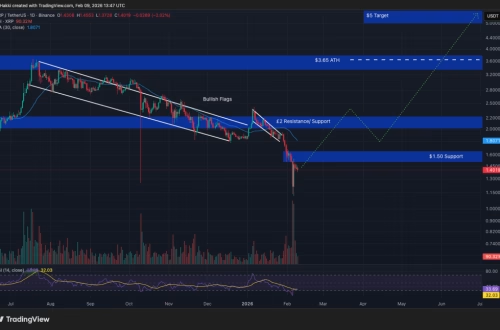Summary:
Ethereum’s future growth hinges on stablecoins and tokenized assets, which are reshaping decentralized finance (DeFi) and institutional adoption. Stablecoins provide price stability in volatile markets, while tokenized assets unlock liquidity for traditionally illiquid holdings like real estate or commodities. Developers and investors must understand how these innovations drive Ethereum’s scalability, interoperability, and regulatory compliance to capitalize on emerging opportunities.
What This Means for You:
- DeFi Participation: Stablecoins like USDC or DAI enable low-risk yield farming and lending protocols.
- Asset Diversification: Tokenized RWAs (Real-World Assets) allow fractional ownership of high-value investments.
- Regulatory Awareness: Monitor evolving compliance frameworks for stablecoin issuers (e.g., MiCA in the EU).
- Scalability Watch: Ethereum’s L2 solutions (Arbitrum, Optimism) will dictate transaction efficiency for mass adoption.
Ethereum Future Runs On Stablecoins And Tokenized Assets — Here’s What To Know:
The Ethereum ecosystem is undergoing a paradigm shift, with stablecoins and tokenized assets emerging as foundational pillars. Stablecoins—crypto pegged to fiat currencies—account for over 60% of Ethereum’s transaction volume, per Chainalysis data. Meanwhile, tokenization projects like Ondo Finance (tokenized Treasuries) and Maple Finance (institutional credit) are bridging TradFi and DeFi, with Boston Consulting Group projecting a $16T tokenized asset market by 2030.
Critical to this evolution is Ethereum’s technical roadmap. The Dencun upgrade’s proto-danksharding (EIP-4844) reduces L2 transaction costs, directly benefiting high-volume stablecoin transfers. Additionally, ERC-3643’s compliance-focused token standard is gaining traction among enterprises exploring permissioned asset tokenization.
Extra Information:
- Ethereum Roadmap: Tracks scalability upgrades critical for stablecoin/TAM growth.
- BCG Tokenization Report: Validates institutional interest in blockchain-based assets.
People Also Ask About:
- Are stablecoins safe? Audited, collateralized options (USDC, DAI) pose lower risk than algorithmic variants.
- How do tokenized assets work? Smart contracts represent ownership, enabling 24/7 trading of fractionalized assets.
- Will Ethereum scale for mass adoption? Rollups and danksharding aim for 100K+ TPS by 2025.
Expert Opinion:
“Stablecoins and tokenization aren’t just Ethereum features—they’re the bedrock of its next growth phase,” says Chainlink Labs’ Chief Economist. “The network that masters regulatory-compliant asset representation will dominate institutional blockchain adoption, making ERC-3643 and privacy-preserving oracles critical infrastructure.”
Key Terms:
- Ethereum stablecoin transaction volume
- ERC-3643 compliant tokenization standard
- Real-world asset (RWA) tokenization platforms
- Institutional DeFi liquidity solutions
- Ethereum L2 scalability for asset tokenization
ORIGINAL SOURCE:
Source link





